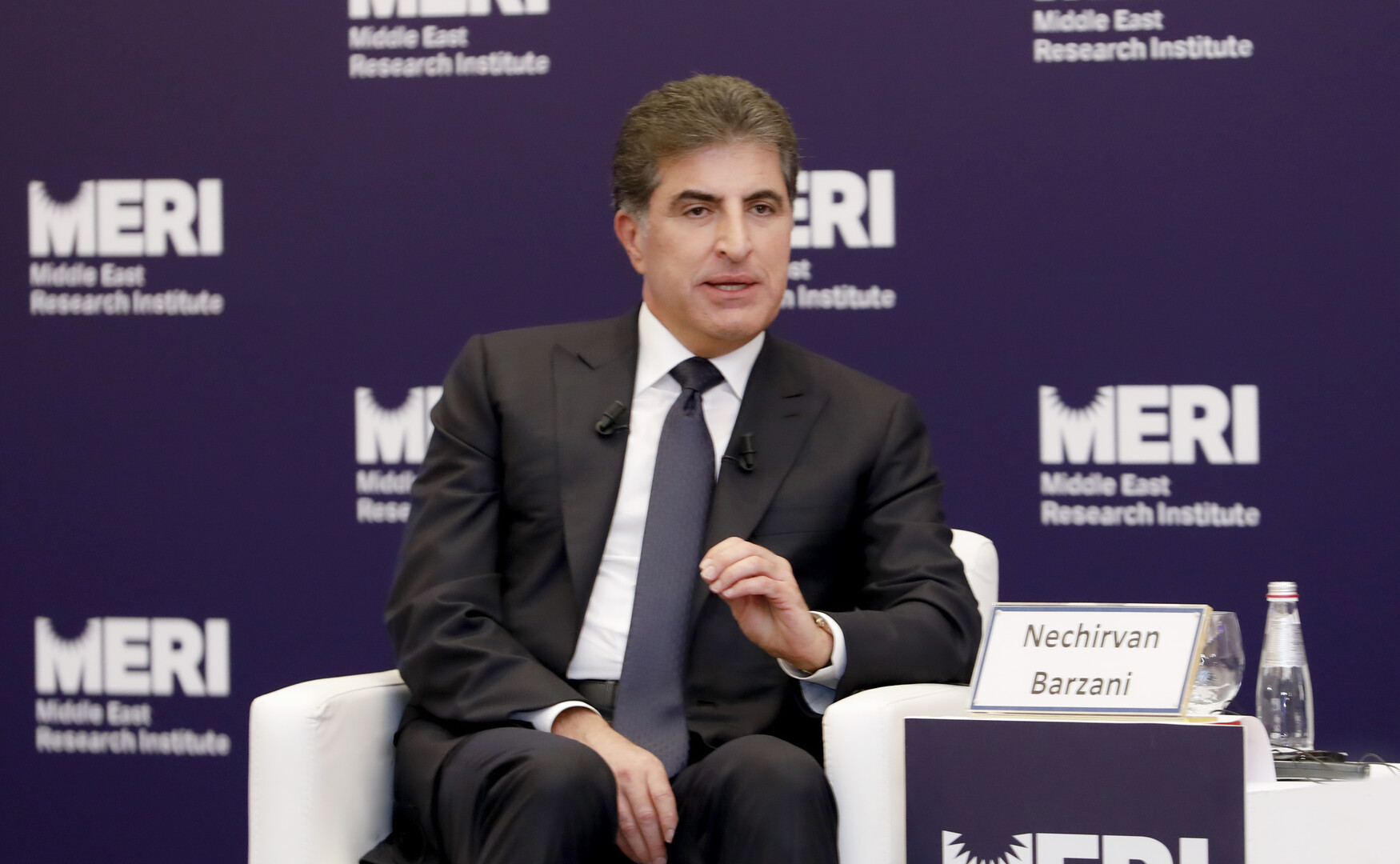
2023-10-10T19:13:34.000000Z
Erbil, Kurdistan Region, October 10, 2023
President Nechirvan Barzani spoke in a panel discussion hosted by the MERI Forum in Erbil. Attended by political and government officials, foreign representatives, university professors and academics, the President discussed the Kurdistan Region, Iraq, and the wider region. The following is a readout of the discussions.
In response to a question about the internal situation, the deepening KDP-PUK divisions and the lack of a strategic agreement or roadmap to resolve the issues, the President said:
“If we go back to earlier years, at the time when the late Mam Jalal and President Masoud Barzani worked together, we were able to make great achievements for our nation and Iraq, with the help and cooperation of all Kurdish parties. The relationship between the PUK and the KDP is important for all of us. There is often a big concern about whether the relationship between the PUK and the KDP is so bad that it will cause major problems. No, it's not so bad that we can't fix it. The reality is that the PUK is going through a transitional period in Kurdistan, especially after the late Mam Jalal. After the passing of Mam Jalal, and after they faced other problems, what we feel now is stability. A better political situation has emerged within the PUK itself, especially after this congress. We look forward to a better future for the relationship between the PUK and the KDP. The issue is not that we must be united. We must find a common understanding on how to work together. I think the PUK has understood that it must work with the KDP, and the KDP has realized that it must work with the PUK. Yes, but the point is how to find the mechanism and make a start, because we have achieved many things together. And of course, because of the divisions between Kurds, all the communities in Kurdistan and the whole of Iraq will lose; because for Iraq, the relationship between the political forces in Kurdistan is also important.”
“Our practical step is to agree on what our mutual vision is for the future of this relationship. It will be similar to what we did with the late Mam Jalal and [which led to] a very good period of political and economic stability. It was created in Kurdistan and lasted for a very long time. We need an agreement and an understanding with the PUK to run the country. I think it should be a realist agreement and we should both look closely at the situation and work together.”
Regarding resolving the differences between Erbil and Baghdad and his visit to Tehran for that purpose, President Nechirvan Barzani said:
"The solution to our problems is in Baghdad and nowhere else. Iran is our neighbor and yes we will visit Iran, but as I said, we are not guests in Iraq, it’s our home. We must be together. We will sit down with our brothers in Baghdad and resolve the issues with patience and sincerity."
On the Kurdistan Region's response to Iran's threats regarding the presence of Kurdish opposition forces in the Kurdistan Region, and the security agreement between Iraq and the Islamic Republic of Iran, he said:
"Here I refer to a principle. According to all international laws, it is not right for Iraq to become a source of threats to any of our neighbors. As a principle, international law does not allow a country to become a safe haven from which opposition groups of other countries launch attacks. Baghdad has signed a security agreement with Tehran and we in the Kurdistan Region are part of the security agreement. Iraq is committed to implementing the agreement. We are committed and what we have done so far has been in accordance with that agreement. In Baghdad, where the case is now managed by Mr. Qasim al-Araji, and in the Kurdistan Region, where it is managed by the Interior Minister. There has been significant progress and we reiterate the principle that the Kurdistan Region is not a threat to the Islamic Republic of Iran. The Islamic Republic of Iran is an important neighbor. We have a long border with the Islamic Republic of Iran, and we want these concerns to be resolved through dialogue. On the contrary, we have taken positive steps and as far as I know, the Islamic Republic of Iran is very grateful for these steps."
Regarding the agreement of the Kurdish parties in Iran with these measures, he said:
“Thankfully, they have a very good understanding of the situation in the Kurdistan Region. I have met with them several times and they are all very concerned about the Kurdistan Region and don’t want the Kurdistan Region to face any problems."
Regarding the Kurdistan Region's relations with Turkey and the problem of exporting oil from the Kurdistan Region, President Nechirvan Barzani said:
"Let me explain where the problem of exporting oil is. Of course, Turkey has now expressed its readiness to open the pipeline and let the oil flow. There are two major obstacles to exporting oil. The first is the payment to the companies. If the oil export is resumed, Baghdad will receive the money, however who will pay the oil companies and how will they be paid? According to the Iraqi budget law, they have set $6 for each barrel of Kurdistan oil, which is very, very low. Iraq pays up to $30 for every barrel elsewhere, in Gayara for example. The companies say if it is six dollars per barrel, they will not extract it! This is a big problem in itself and it must be solved. The other is that SOMO must sign contracts with the companies that have bought Kurdistan's oil so far. I think this will not be a problem because they are working on it now. They will talk to each other, but this problem lies with Iraq. Of course, the problem is not in Turkey, but in Baghdad."
Regarding the PKK and their presence in the Kurdistan Region, both his and President Masoud Barzani’s role in bringing the PKK and the Turkish government closer together, and other opportunities to revive this rapprochement, the President said:
"In principle, this problem must be solved through dialogue and cannot be solved militarily. The nature of problem is such that it must be resolved politically. My answer is specifically that just as I spoke about Iran, the same principle applies to Turkey, and the Kurdistan Region should not become a threat to neighboring countries. As an important neighboring country, we apply this principle to Turkey as well. The major concern is that the PKK is a big problem, a big problem for the Kurdistan Region. The PKK has no respect for the institutions of the Kurdistan Region. We cannot guarantee that Turkey will do nothing. As for mediation, the late Mam Jalal played that role in the past, President Masoud Barzani has played that role and I have tried, and we have made great progress. We have done a lot [of mediation] very quietly. If the question is, do you see that opportunity now? We want to have an opportunity and we want to play a role in the solution, but it is not clear at this time."
Asked whether he had discussed with Turkey the opening of Sulaymaniyah International Airport to Turkish flights, he said:
"Yes, I have discussed this with them and we are in continuous discussions to eliminate any concerns that Turkey has about it, these concerns and the arrival of Turkish and other countries' planes at Slemani to be normal, and we are in constant contact with them. They have some concerns that need to be addressed in order to take another step forward."
Regarding the United States and its alliance with the Kurdistan Region and the Kurds in Syria, he said:
“If we look at history, since 1991, the United States has been a major factor in protecting the Kurdistan Region when they created the no-fly zone with Britain and other allies, France, were the main supporters. If we look at all these stages, we see that the United States has been a major supporter of the Kurdistan Region. If others in Europe had not helped the Kurdistan Region and Iraq in the fight against ISIS, the outcome would not have been clear. We have immense gratitude for the role of the United States and its allies in Europe and the allies who have really helped us. There is a strategic agreement between the United States and Iraq and the Kurdistan Region as part of Iraq, and there are many opportunities for the Kurdistan Region to benefit from this strategic agreement and play a role. So I want to say that the role of the United States so far has been to encourage both sides to resolve differences internally, and constantly encourages us to negotiate and resolve differences with Baghdad. Nothing has changed here. The reason that the US may seem disengaged in Iraq is, I think because the US is engaged with many other concerns. The issue is that they have many priorities now. Otherwise, we will not see a really big change in US policy towards the Kurdistan Region and Iraq."
Regarding the US’ demands in the Kurdistan Region, especially the reunification of the Peshmerga, President Nechirvan Barzani said:
“On the Peshmerga forces, I think their complaints about the PUK and KDP are very legitimate, because the problem is what do the US and the allies of the US, Germany, France, Italy, these countries, what do they want? They want the Peshmerga to be united and the Peshmerga forces to be united. They complain that the PUK and KDP are not taking enough steps to address this problem. Their complaint is largely justified. This does not mean that no steps have been taken. Some steps have been taken. But the steps are small, the steps are slow and they want this process be done better and faster.”
Regarding the date of the reunification of the Peshmerga forces, he said:
“We are in a process as I mentioned, we are in a process that has started and there has been some progress. At the last meeting we had two weeks ago, as the President of the Region I viewed it with optimism because I saw that we have made some progress. But have we now reached the stage that our friends and allies who support this process are demanding? No, but there is progress on the issue. I can’t tell you when it will be completed, but I feel the process is improving now.”
Regarding Iraq and President Nechirvan Barzani’s proposal for a meeting between Baghdad and Erbil to reach a common system for federalism and the party with whom this meeting should be held, he said:
"In my opinion, we must have a serious dialogue with our allies who have formed the government. We must have a serious dialogue with our allies in the State Administration [Coalition}. This should be done and a serious mechanism should be established. In terms of finance, what Baghdad is doing with the Kurdistan Region is not like any other federalism in the world, nothing like it. That is why we have to sit down one day, we have been saying this for 20 years and now it's time. I am not saying that it is all Baghdad's fault. We have a definition of what a federal system is. Kurdistan has come a long way in some things and Baghdad has not come forward in some things. We must sit down and resolve all these issues through dialogue and Iraq will truly become a federal Iraq. In 2003, we went to Baghdad with these promises [made to us]. Look at the situation. Since 2003, when we participated in the formation of the new Iraq, not much has changed politically for the Kurdistan Region. Before 2003, we had the same situation as we have now, but promises were made that the system would be federal, democratic, and until the end, all of us were hopeful that we really have a new Iraq. Iraq was facing problems, there were internal problems. Terrorism was Iraq's biggest problem. ISIS was a great disaster for all of us. In the Kurdistan Region, we had more than two million refugees and more than 1,000 kilometers of border with ISIS. On the front lines of the war, nearly 2,000 Peshmerga gave their lives. Elsewhere in Iraq, the Iraqi army and Hashd al-Shaabi have all given their lives to protect Iraq. Now I think it's not a complaint, it's a request. It's time to hold a serious meeting without insincerity and have a proper definition of federalism and how to govern Iraq."
Regarding the parties' non-compliance with the political agreement in Iraq, he said:
“The parties I mentioned, those who formed the government and those who together established Iraq after 2003, must sit down. Where are the shortcomings, and within that framework we can identify them and together. The biggest question is whether the Kurdistan Region is part of Iraq or not. Are we Iraqi citizens or not? These two questions are very important. We consider any progress in any part of Iraq as our progress, we will be happy to see that progress in Basra, we will be happy to see that progress in Anbar. It is not clear what system of governance we have in Iraq. If we can solve this, the budget problem will be solved and the salary problem will be solved because we will reach an understanding on jointly running the country. This is the biggest priority. When we went to Germany, the German Chancellor asked: ‘How can we help you?’ I said, ‘You have a very proper federal system. Help us to implement the federal system in Iraq.’
Later at the Forum and following his remarks, participants put questions to President Nechirvan Barzani. The following is a readout of the question and answer session. In response to a question about the existence of a roadmap for negotiations with Baghdad, the President said:
“Of course, I don't think there is any problem or difference of opinion among the political parties in Kurdistan, including all communities, on the issue of the constitutional rights of the Kurdistan Region with Baghdad, of course, we will have a roadmap to resolve these matters.”
In response to a question about the weakening of US support in the Kurdistan Region, he said:
How does the US see Iraq? The United States has always stressed the integrity of Iraq's territory, and a strong Region within Iraq that can help itself and can help Iraq. I don't see any changes in US policy on this issue, but we don't need others to solve our problems. We may need technical help, but the important thing is that we have to solve our problems ourselves. We ourselves as one entity must sit at the negotiating table in Baghdad and resolve the problems because we have a common future together. We need to start solving the problems and then we can seek support from the US and other partners.”
Asked about the situation between Israel and the Palestinians, he said:
“Of course, as a nation and as Iraq, no one knows as much as our people what the misery of war means. This issue cannot be resolved through war. It must be resolved peacefully. It must be resolved through dialogue and the right of the Palestinian people to have their own state. Looking at the region, we see that the Palestinians have a right to their own state. They should have their own state and live in peace in the region. What has been done now, the blockade that is now imposed on Gaza, it is not positive because we know what this means. Blocking food and water to a city which is 40 kilometers long and 10 kilometers wide and has a population of 2.3 million. This is leading to a major humanitarian disaster. What we hope is that this war will end as soon as possible. We hope that it will not spread anywhere else, not to Iraq or any other country.
Asked about the Iraqi Federal Supreme Court, he said:
“As for the Federal Court, yes, we as the Kurdistan Region are dissatisfied with many of the decisions of the Federal Court. The Federal Court is one of the cases that must be resolved through dialogue with Baghdad. The Kurdistan Region cannot do that. We must resolve them through dialogue with our partners.”
In response to a question about Turkey, he said:
“As for Turkey, the same principle applies to Iran, but it is different, very different. The difference is that the Iranian (Kurdish) opposition respects the Kurdistan Region’s institutions much more than the PKK does, and they are very concerned. They should prevent major problems for the Kurdistan Region. Unfortunately, the PKK does not have that view. The PKK is part of a very big problem and a big headache for the Kurdistan Region and for everywhere in Iraq."
Asked about Iraq's efforts to protect Iran's security, he said:
"I think in principle, Iraq is serious that it should not become a country that undermines the security of any country. Iraq is serious about that. Iraq wants to live in peace and without problems with its neighbors. I must give special thanks to the role of Mr. Qasim al-Araji as the National Security Advisor in Iraq, he and his team and those in the Kurdistan Regional Government (KRG) and the KRG Minister of Interior. Of course, we must thank our Interior Minister for working very seriously on this issue and making serious efforts to resolve it.”
In response to a question about the implementing governorate status for Halabja and his previous efforts in this regard, President Nechirvan Barzani said:
“Yes, I assure you that we will take this matter seriously. It should be one of our top priorities for dialogue with Baghdad and, God willing, we will find a solution.”
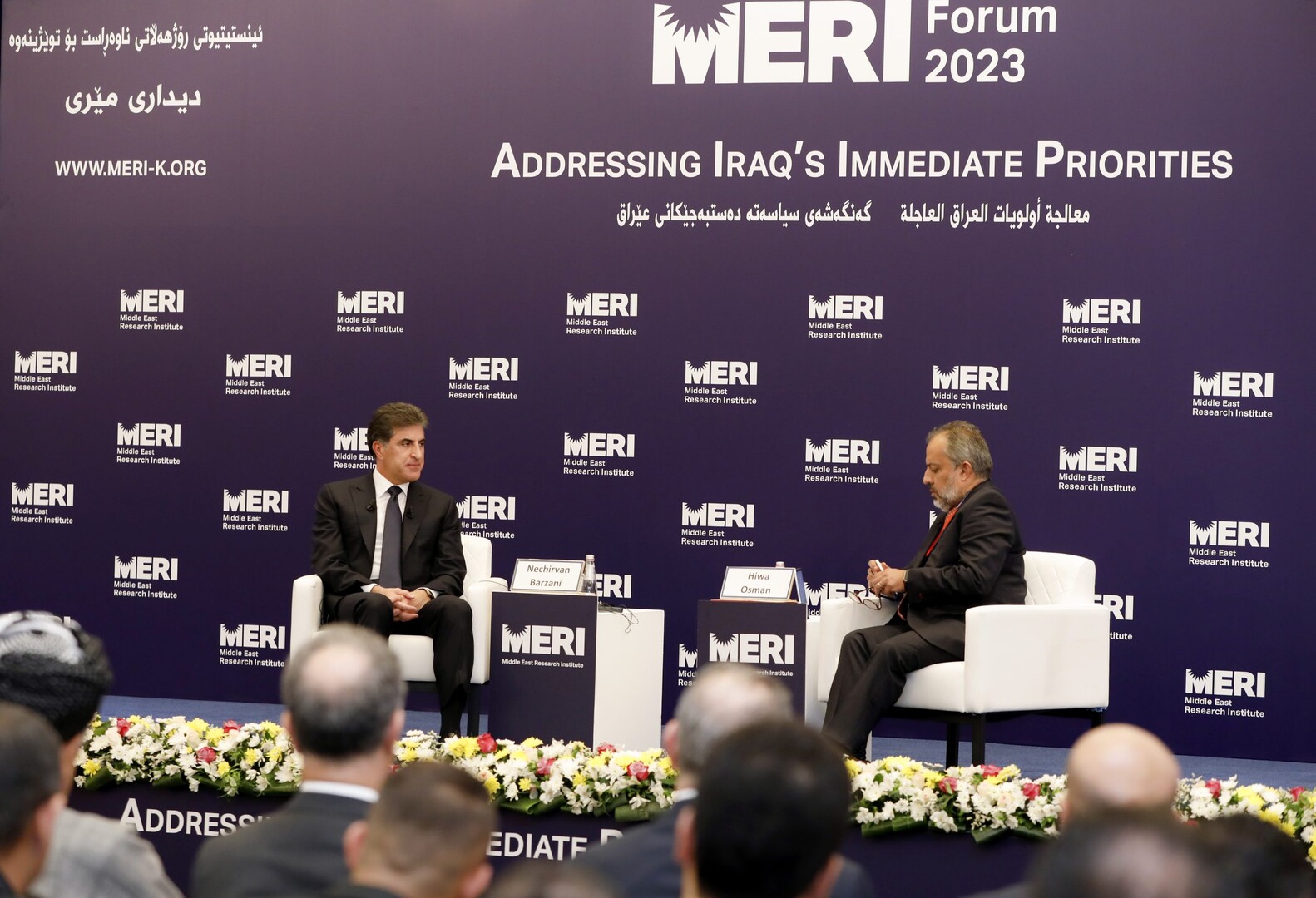
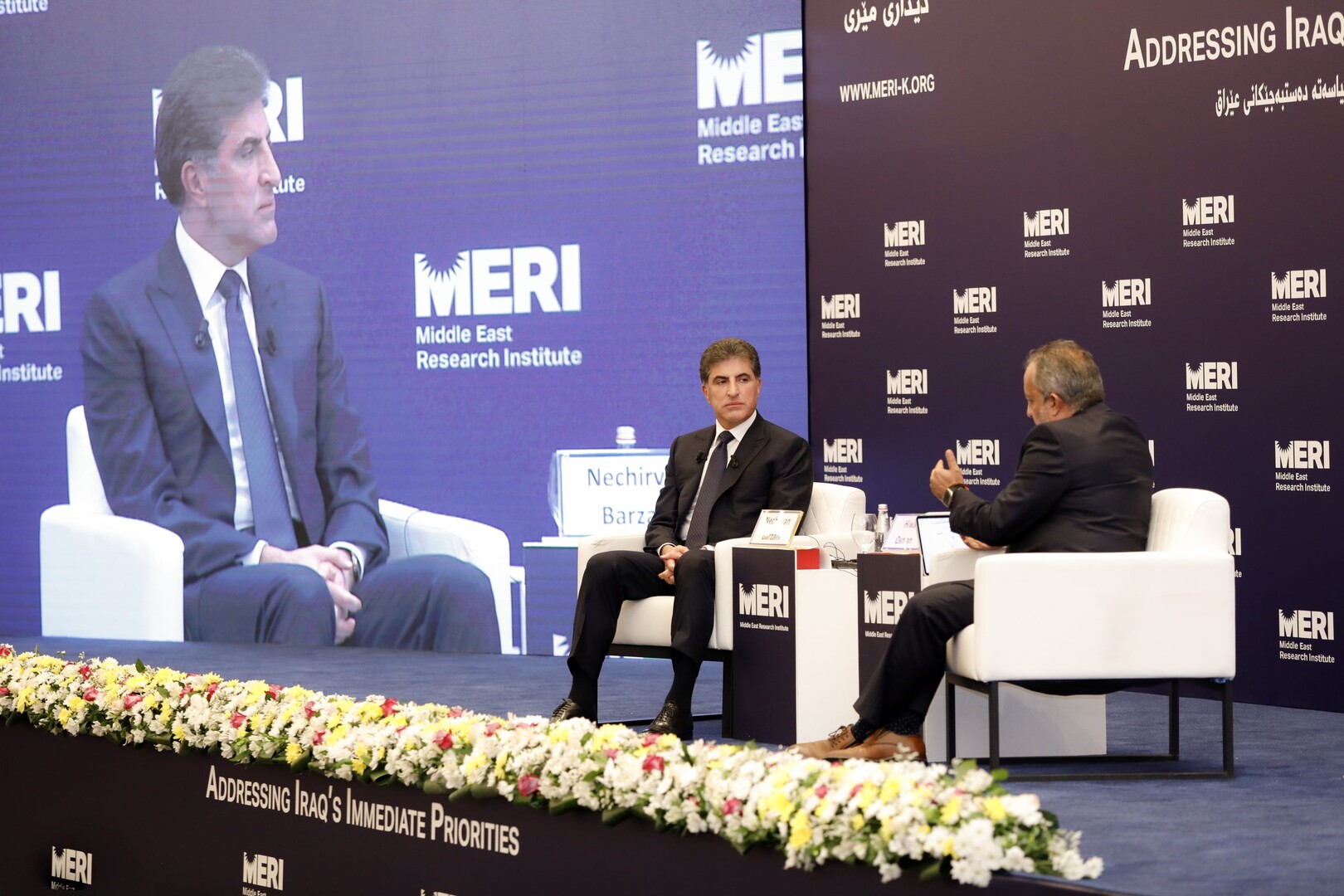
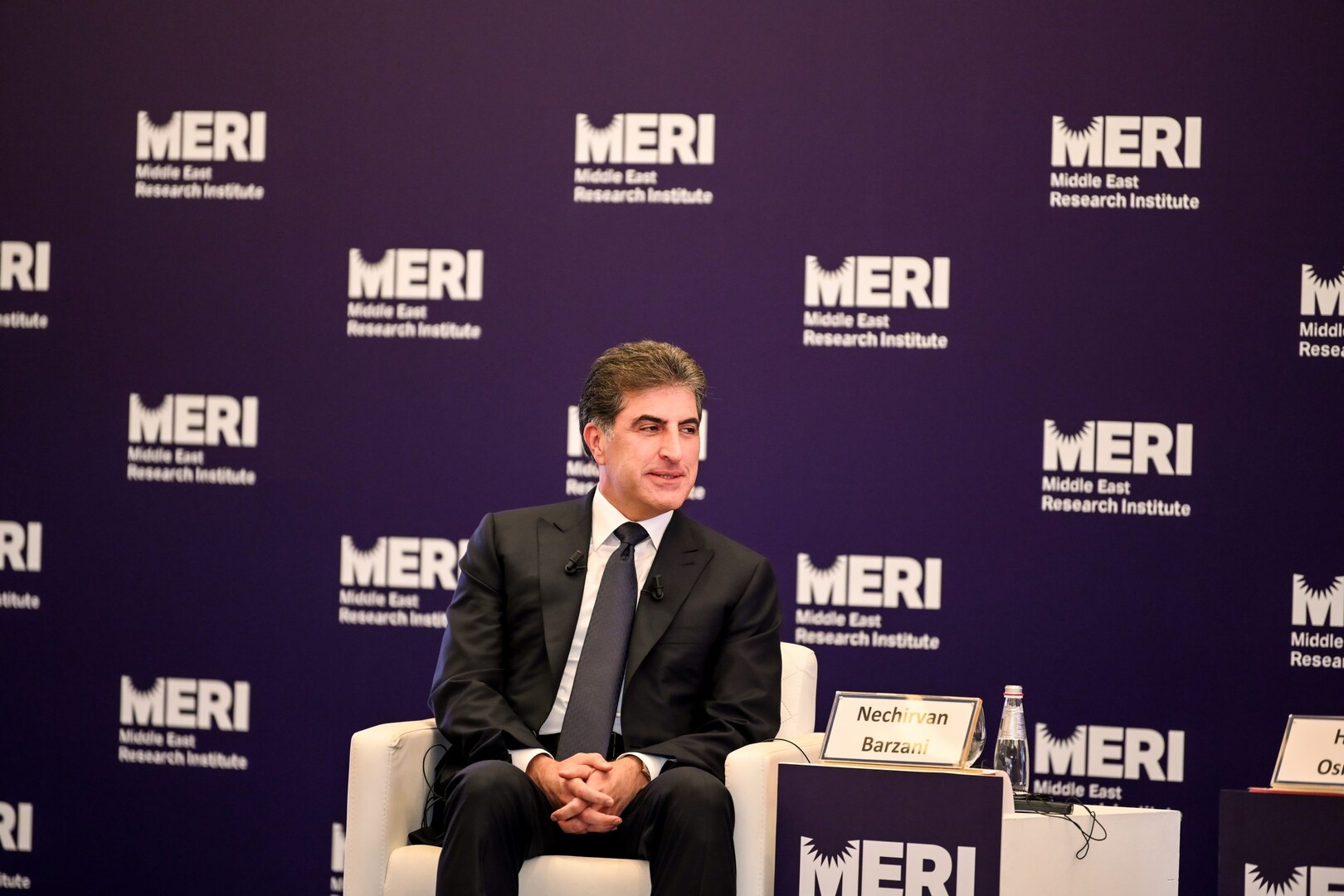
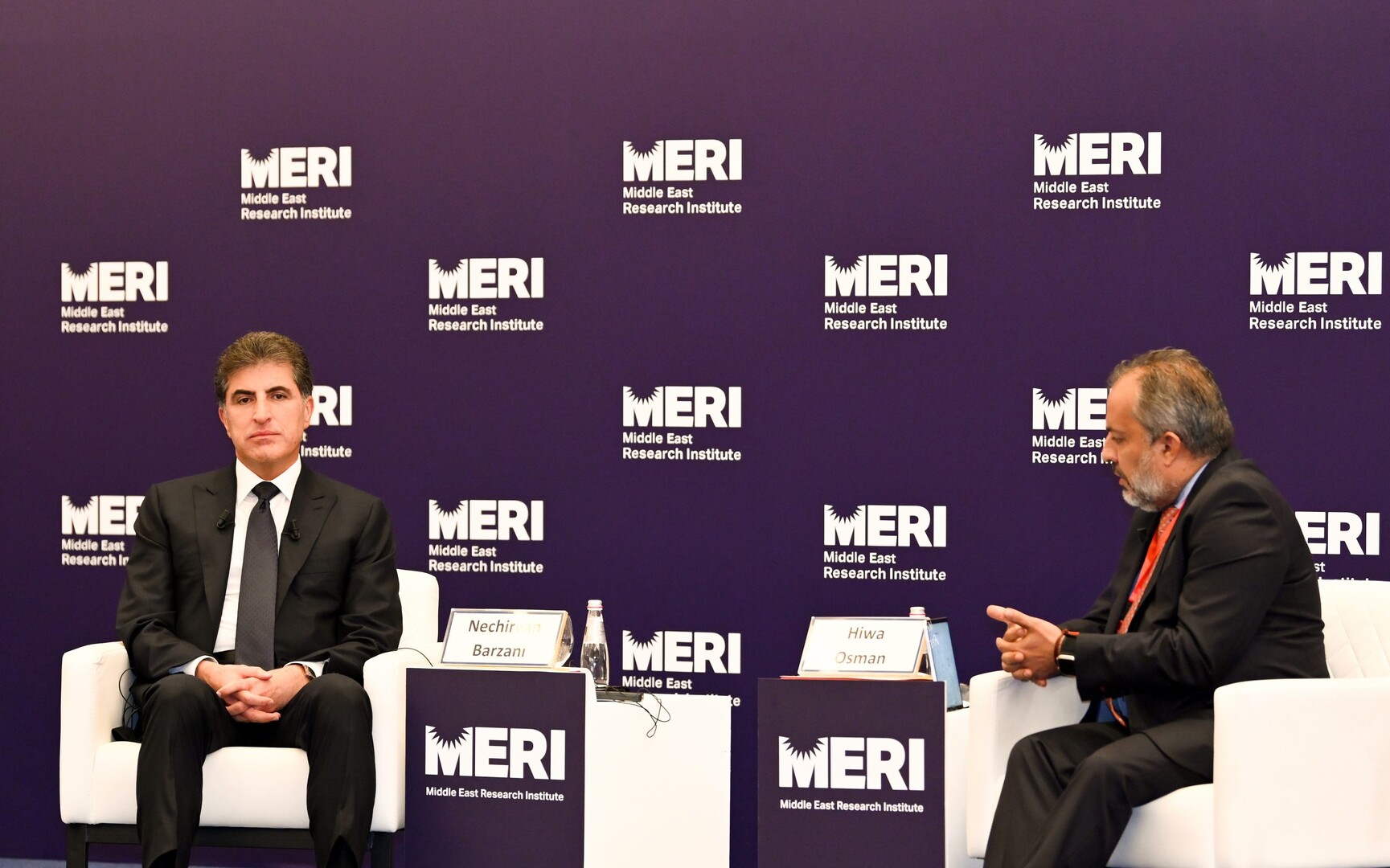
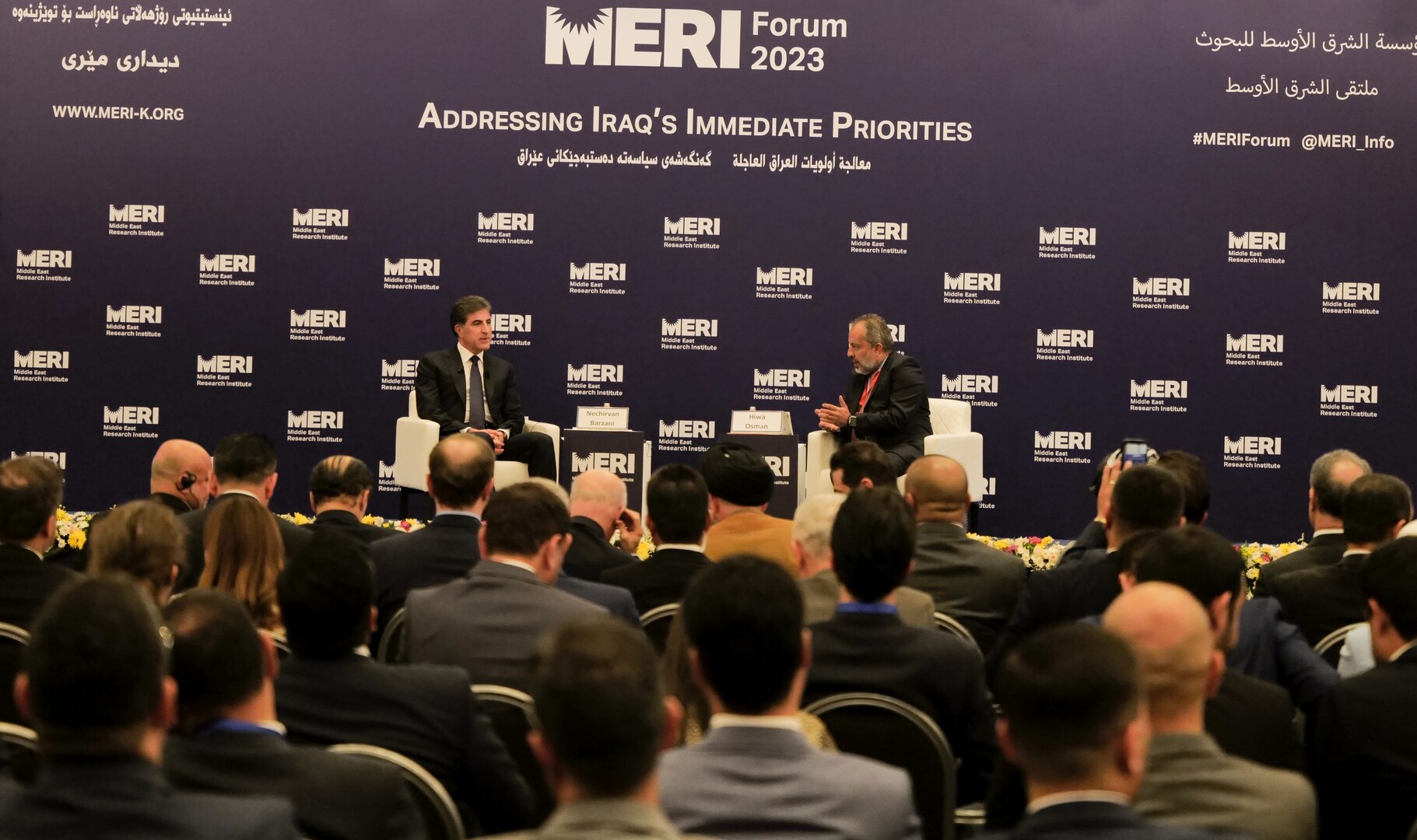
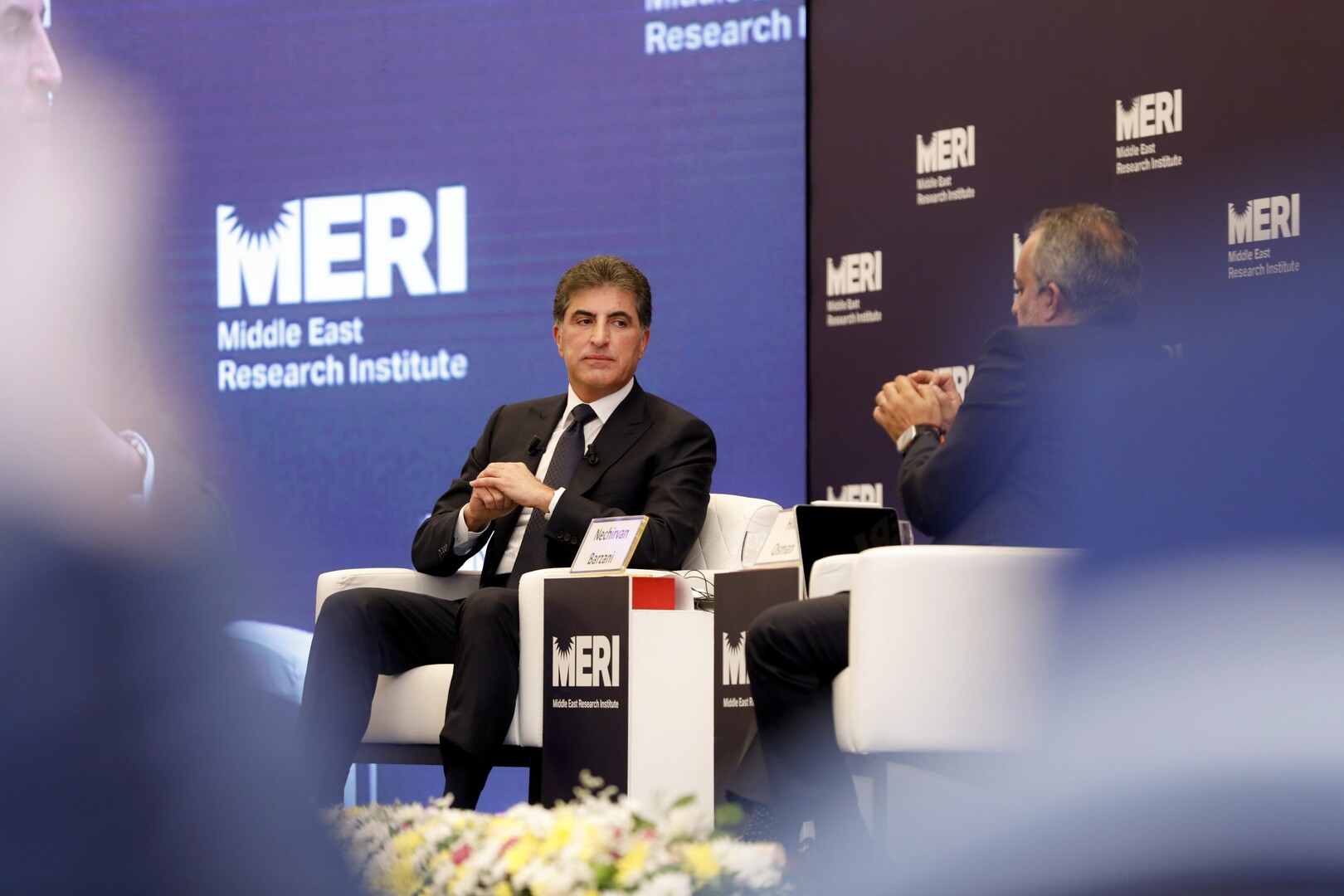
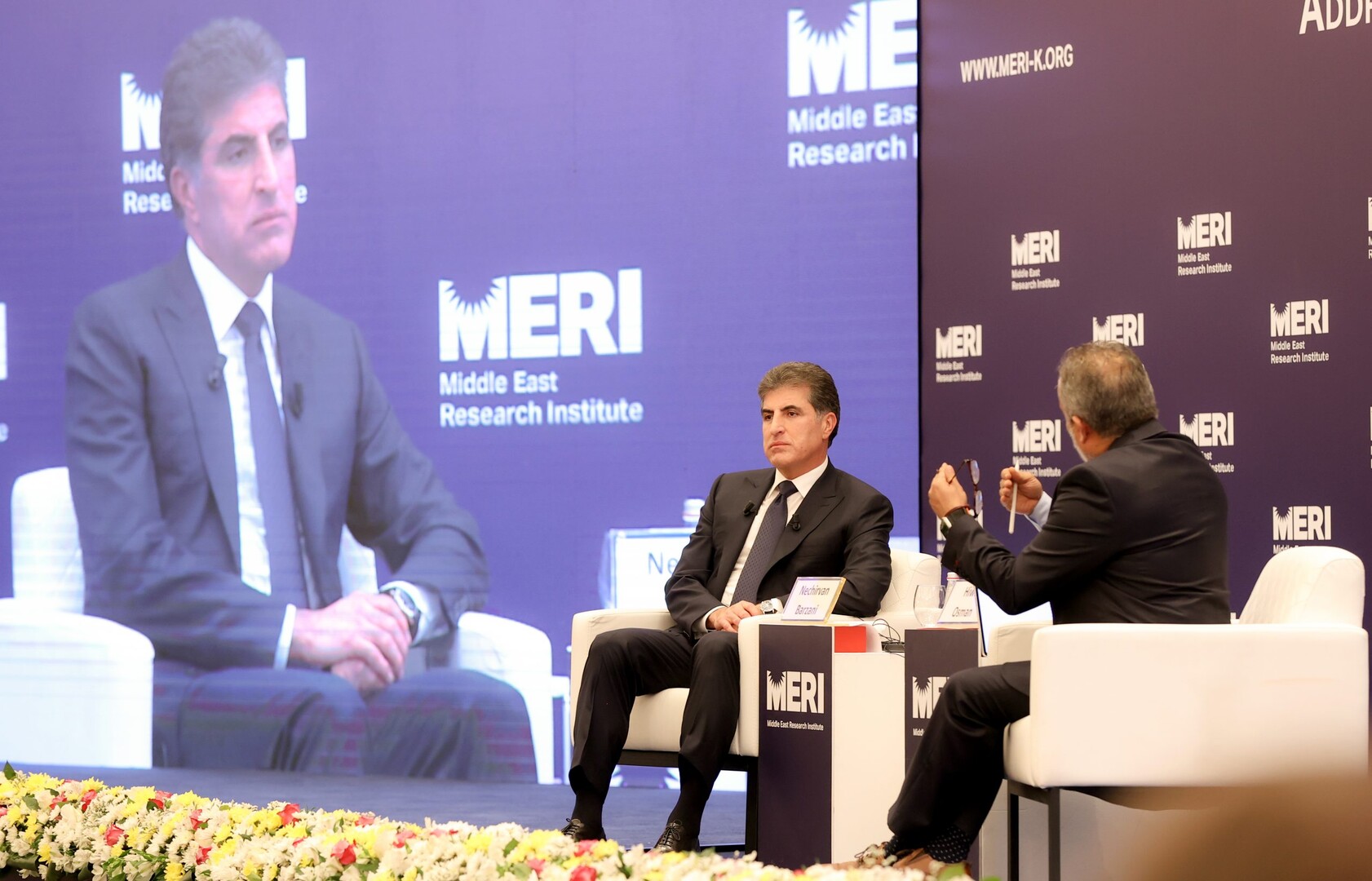
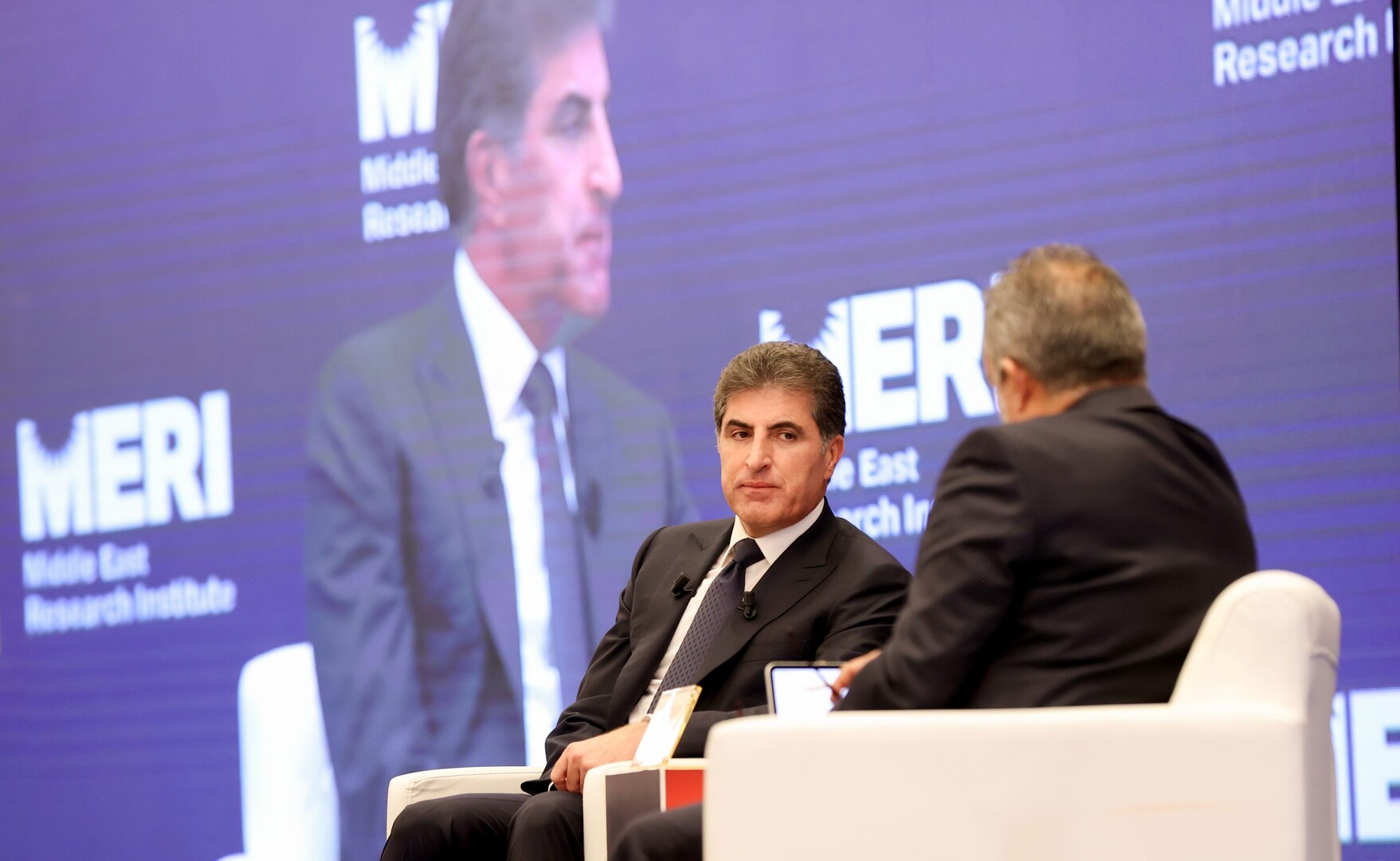
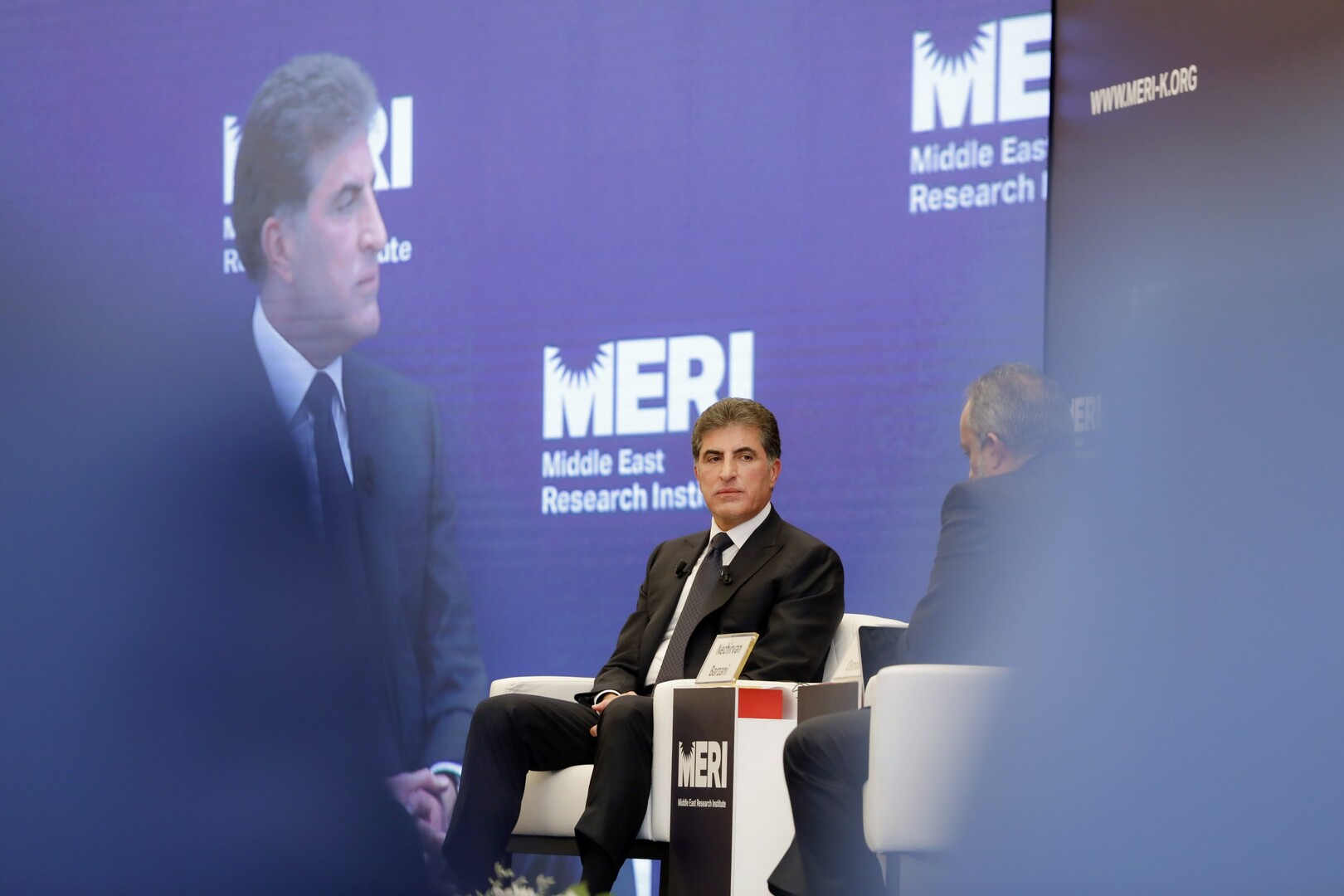
President Nechirvan Barzani spoke in a panel discussion hosted by the MERI Forum in Erbil. Attended by political and government officials, foreign representatives, university professors and academics, the President discussed the Kurdistan Region, Iraq, and the wider region. The following is a readout of the discussions.
In response to a question about the internal situation, the deepening KDP-PUK divisions and the lack of a strategic agreement or roadmap to resolve the issues, the President said:
“If we go back to earlier years, at the time when the late Mam Jalal and President Masoud Barzani worked together, we were able to make great achievements for our nation and Iraq, with the help and cooperation of all Kurdish parties. The relationship between the PUK and the KDP is important for all of us. There is often a big concern about whether the relationship between the PUK and the KDP is so bad that it will cause major problems. No, it's not so bad that we can't fix it. The reality is that the PUK is going through a transitional period in Kurdistan, especially after the late Mam Jalal. After the passing of Mam Jalal, and after they faced other problems, what we feel now is stability. A better political situation has emerged within the PUK itself, especially after this congress. We look forward to a better future for the relationship between the PUK and the KDP. The issue is not that we must be united. We must find a common understanding on how to work together. I think the PUK has understood that it must work with the KDP, and the KDP has realized that it must work with the PUK. Yes, but the point is how to find the mechanism and make a start, because we have achieved many things together. And of course, because of the divisions between Kurds, all the communities in Kurdistan and the whole of Iraq will lose; because for Iraq, the relationship between the political forces in Kurdistan is also important.”
“Our practical step is to agree on what our mutual vision is for the future of this relationship. It will be similar to what we did with the late Mam Jalal and [which led to] a very good period of political and economic stability. It was created in Kurdistan and lasted for a very long time. We need an agreement and an understanding with the PUK to run the country. I think it should be a realist agreement and we should both look closely at the situation and work together.”
Regarding resolving the differences between Erbil and Baghdad and his visit to Tehran for that purpose, President Nechirvan Barzani said:
"The solution to our problems is in Baghdad and nowhere else. Iran is our neighbor and yes we will visit Iran, but as I said, we are not guests in Iraq, it’s our home. We must be together. We will sit down with our brothers in Baghdad and resolve the issues with patience and sincerity."
On the Kurdistan Region's response to Iran's threats regarding the presence of Kurdish opposition forces in the Kurdistan Region, and the security agreement between Iraq and the Islamic Republic of Iran, he said:
"Here I refer to a principle. According to all international laws, it is not right for Iraq to become a source of threats to any of our neighbors. As a principle, international law does not allow a country to become a safe haven from which opposition groups of other countries launch attacks. Baghdad has signed a security agreement with Tehran and we in the Kurdistan Region are part of the security agreement. Iraq is committed to implementing the agreement. We are committed and what we have done so far has been in accordance with that agreement. In Baghdad, where the case is now managed by Mr. Qasim al-Araji, and in the Kurdistan Region, where it is managed by the Interior Minister. There has been significant progress and we reiterate the principle that the Kurdistan Region is not a threat to the Islamic Republic of Iran. The Islamic Republic of Iran is an important neighbor. We have a long border with the Islamic Republic of Iran, and we want these concerns to be resolved through dialogue. On the contrary, we have taken positive steps and as far as I know, the Islamic Republic of Iran is very grateful for these steps."
Regarding the agreement of the Kurdish parties in Iran with these measures, he said:
“Thankfully, they have a very good understanding of the situation in the Kurdistan Region. I have met with them several times and they are all very concerned about the Kurdistan Region and don’t want the Kurdistan Region to face any problems."
Regarding the Kurdistan Region's relations with Turkey and the problem of exporting oil from the Kurdistan Region, President Nechirvan Barzani said:
"Let me explain where the problem of exporting oil is. Of course, Turkey has now expressed its readiness to open the pipeline and let the oil flow. There are two major obstacles to exporting oil. The first is the payment to the companies. If the oil export is resumed, Baghdad will receive the money, however who will pay the oil companies and how will they be paid? According to the Iraqi budget law, they have set $6 for each barrel of Kurdistan oil, which is very, very low. Iraq pays up to $30 for every barrel elsewhere, in Gayara for example. The companies say if it is six dollars per barrel, they will not extract it! This is a big problem in itself and it must be solved. The other is that SOMO must sign contracts with the companies that have bought Kurdistan's oil so far. I think this will not be a problem because they are working on it now. They will talk to each other, but this problem lies with Iraq. Of course, the problem is not in Turkey, but in Baghdad."
Regarding the PKK and their presence in the Kurdistan Region, both his and President Masoud Barzani’s role in bringing the PKK and the Turkish government closer together, and other opportunities to revive this rapprochement, the President said:
"In principle, this problem must be solved through dialogue and cannot be solved militarily. The nature of problem is such that it must be resolved politically. My answer is specifically that just as I spoke about Iran, the same principle applies to Turkey, and the Kurdistan Region should not become a threat to neighboring countries. As an important neighboring country, we apply this principle to Turkey as well. The major concern is that the PKK is a big problem, a big problem for the Kurdistan Region. The PKK has no respect for the institutions of the Kurdistan Region. We cannot guarantee that Turkey will do nothing. As for mediation, the late Mam Jalal played that role in the past, President Masoud Barzani has played that role and I have tried, and we have made great progress. We have done a lot [of mediation] very quietly. If the question is, do you see that opportunity now? We want to have an opportunity and we want to play a role in the solution, but it is not clear at this time."
Asked whether he had discussed with Turkey the opening of Sulaymaniyah International Airport to Turkish flights, he said:
"Yes, I have discussed this with them and we are in continuous discussions to eliminate any concerns that Turkey has about it, these concerns and the arrival of Turkish and other countries' planes at Slemani to be normal, and we are in constant contact with them. They have some concerns that need to be addressed in order to take another step forward."
Regarding the United States and its alliance with the Kurdistan Region and the Kurds in Syria, he said:
“If we look at history, since 1991, the United States has been a major factor in protecting the Kurdistan Region when they created the no-fly zone with Britain and other allies, France, were the main supporters. If we look at all these stages, we see that the United States has been a major supporter of the Kurdistan Region. If others in Europe had not helped the Kurdistan Region and Iraq in the fight against ISIS, the outcome would not have been clear. We have immense gratitude for the role of the United States and its allies in Europe and the allies who have really helped us. There is a strategic agreement between the United States and Iraq and the Kurdistan Region as part of Iraq, and there are many opportunities for the Kurdistan Region to benefit from this strategic agreement and play a role. So I want to say that the role of the United States so far has been to encourage both sides to resolve differences internally, and constantly encourages us to negotiate and resolve differences with Baghdad. Nothing has changed here. The reason that the US may seem disengaged in Iraq is, I think because the US is engaged with many other concerns. The issue is that they have many priorities now. Otherwise, we will not see a really big change in US policy towards the Kurdistan Region and Iraq."
Regarding the US’ demands in the Kurdistan Region, especially the reunification of the Peshmerga, President Nechirvan Barzani said:
“On the Peshmerga forces, I think their complaints about the PUK and KDP are very legitimate, because the problem is what do the US and the allies of the US, Germany, France, Italy, these countries, what do they want? They want the Peshmerga to be united and the Peshmerga forces to be united. They complain that the PUK and KDP are not taking enough steps to address this problem. Their complaint is largely justified. This does not mean that no steps have been taken. Some steps have been taken. But the steps are small, the steps are slow and they want this process be done better and faster.”
Regarding the date of the reunification of the Peshmerga forces, he said:
“We are in a process as I mentioned, we are in a process that has started and there has been some progress. At the last meeting we had two weeks ago, as the President of the Region I viewed it with optimism because I saw that we have made some progress. But have we now reached the stage that our friends and allies who support this process are demanding? No, but there is progress on the issue. I can’t tell you when it will be completed, but I feel the process is improving now.”
Regarding Iraq and President Nechirvan Barzani’s proposal for a meeting between Baghdad and Erbil to reach a common system for federalism and the party with whom this meeting should be held, he said:
"In my opinion, we must have a serious dialogue with our allies who have formed the government. We must have a serious dialogue with our allies in the State Administration [Coalition}. This should be done and a serious mechanism should be established. In terms of finance, what Baghdad is doing with the Kurdistan Region is not like any other federalism in the world, nothing like it. That is why we have to sit down one day, we have been saying this for 20 years and now it's time. I am not saying that it is all Baghdad's fault. We have a definition of what a federal system is. Kurdistan has come a long way in some things and Baghdad has not come forward in some things. We must sit down and resolve all these issues through dialogue and Iraq will truly become a federal Iraq. In 2003, we went to Baghdad with these promises [made to us]. Look at the situation. Since 2003, when we participated in the formation of the new Iraq, not much has changed politically for the Kurdistan Region. Before 2003, we had the same situation as we have now, but promises were made that the system would be federal, democratic, and until the end, all of us were hopeful that we really have a new Iraq. Iraq was facing problems, there were internal problems. Terrorism was Iraq's biggest problem. ISIS was a great disaster for all of us. In the Kurdistan Region, we had more than two million refugees and more than 1,000 kilometers of border with ISIS. On the front lines of the war, nearly 2,000 Peshmerga gave their lives. Elsewhere in Iraq, the Iraqi army and Hashd al-Shaabi have all given their lives to protect Iraq. Now I think it's not a complaint, it's a request. It's time to hold a serious meeting without insincerity and have a proper definition of federalism and how to govern Iraq."
Regarding the parties' non-compliance with the political agreement in Iraq, he said:
“The parties I mentioned, those who formed the government and those who together established Iraq after 2003, must sit down. Where are the shortcomings, and within that framework we can identify them and together. The biggest question is whether the Kurdistan Region is part of Iraq or not. Are we Iraqi citizens or not? These two questions are very important. We consider any progress in any part of Iraq as our progress, we will be happy to see that progress in Basra, we will be happy to see that progress in Anbar. It is not clear what system of governance we have in Iraq. If we can solve this, the budget problem will be solved and the salary problem will be solved because we will reach an understanding on jointly running the country. This is the biggest priority. When we went to Germany, the German Chancellor asked: ‘How can we help you?’ I said, ‘You have a very proper federal system. Help us to implement the federal system in Iraq.’
Later at the Forum and following his remarks, participants put questions to President Nechirvan Barzani. The following is a readout of the question and answer session. In response to a question about the existence of a roadmap for negotiations with Baghdad, the President said:
“Of course, I don't think there is any problem or difference of opinion among the political parties in Kurdistan, including all communities, on the issue of the constitutional rights of the Kurdistan Region with Baghdad, of course, we will have a roadmap to resolve these matters.”
In response to a question about the weakening of US support in the Kurdistan Region, he said:
How does the US see Iraq? The United States has always stressed the integrity of Iraq's territory, and a strong Region within Iraq that can help itself and can help Iraq. I don't see any changes in US policy on this issue, but we don't need others to solve our problems. We may need technical help, but the important thing is that we have to solve our problems ourselves. We ourselves as one entity must sit at the negotiating table in Baghdad and resolve the problems because we have a common future together. We need to start solving the problems and then we can seek support from the US and other partners.”
Asked about the situation between Israel and the Palestinians, he said:
“Of course, as a nation and as Iraq, no one knows as much as our people what the misery of war means. This issue cannot be resolved through war. It must be resolved peacefully. It must be resolved through dialogue and the right of the Palestinian people to have their own state. Looking at the region, we see that the Palestinians have a right to their own state. They should have their own state and live in peace in the region. What has been done now, the blockade that is now imposed on Gaza, it is not positive because we know what this means. Blocking food and water to a city which is 40 kilometers long and 10 kilometers wide and has a population of 2.3 million. This is leading to a major humanitarian disaster. What we hope is that this war will end as soon as possible. We hope that it will not spread anywhere else, not to Iraq or any other country.
Asked about the Iraqi Federal Supreme Court, he said:
“As for the Federal Court, yes, we as the Kurdistan Region are dissatisfied with many of the decisions of the Federal Court. The Federal Court is one of the cases that must be resolved through dialogue with Baghdad. The Kurdistan Region cannot do that. We must resolve them through dialogue with our partners.”
In response to a question about Turkey, he said:
“As for Turkey, the same principle applies to Iran, but it is different, very different. The difference is that the Iranian (Kurdish) opposition respects the Kurdistan Region’s institutions much more than the PKK does, and they are very concerned. They should prevent major problems for the Kurdistan Region. Unfortunately, the PKK does not have that view. The PKK is part of a very big problem and a big headache for the Kurdistan Region and for everywhere in Iraq."
Asked about Iraq's efforts to protect Iran's security, he said:
"I think in principle, Iraq is serious that it should not become a country that undermines the security of any country. Iraq is serious about that. Iraq wants to live in peace and without problems with its neighbors. I must give special thanks to the role of Mr. Qasim al-Araji as the National Security Advisor in Iraq, he and his team and those in the Kurdistan Regional Government (KRG) and the KRG Minister of Interior. Of course, we must thank our Interior Minister for working very seriously on this issue and making serious efforts to resolve it.”
In response to a question about the implementing governorate status for Halabja and his previous efforts in this regard, President Nechirvan Barzani said:
“Yes, I assure you that we will take this matter seriously. It should be one of our top priorities for dialogue with Baghdad and, God willing, we will find a solution.”














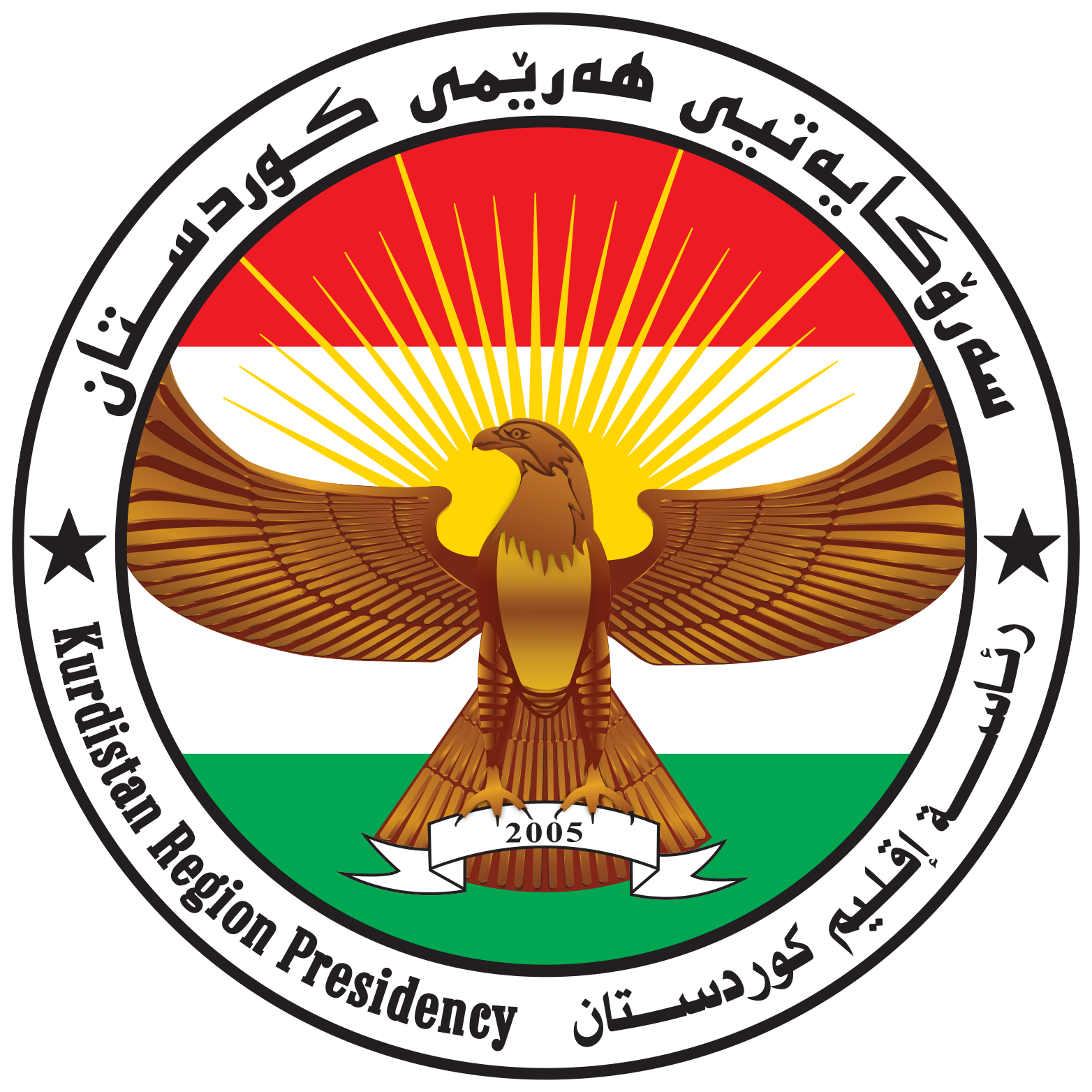

 پەرلەمانی کوردستان
پەرلەمانی کوردستان
